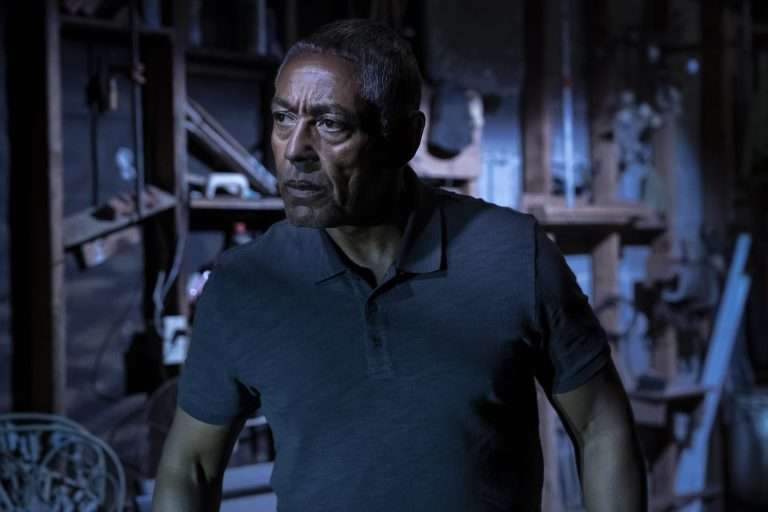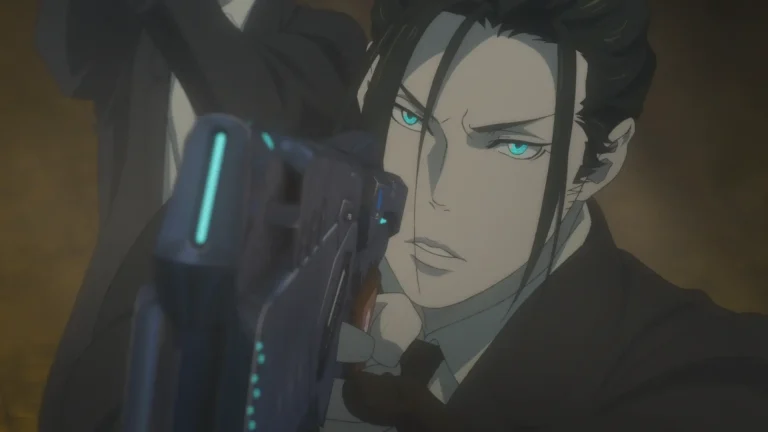Francis Lawrence’s film “The Long Walk” (2025) reshapes Stephen King’s dystopian vision into a quietly devastating meditation on endurance, solidarity, and the quiet defiance of oppressive power. What first appears to be a national spectacle designed to glorify a militarized regime gradually transforms into a subtle, almost wordless rebellion against a system built on mechanized dehumanization.
Though the Walk begins as a brutal contest of survival, it slowly deepens into something far more human. Victory becomes less about outlasting others and more about forging fragile bonds in the shadow of death. As the miles stretch on and the bodies fall, Ray and the remaining walkers confront the raw, unvarnished meaning of being alive in a country that has stripped compassion from patriotism.
Spoilers Ahead
The Long Walk (2025) Plot Summary & Movie Synopsis:
Why Does Ray Decide to Participate in the Walk?
Ray’s decision to join “The Long Walk” stems from desperation and defiance. The economic depression has stripped ordinary citizens of dignity, and the regime manipulates hope through the illusion of choice. Though his mother begs him to withdraw, Ray sees the Walk as his only chance to reclaim agency after his father’s execution for opposing the government. His motivation isn’t glory, it’s vengeance masked as duty. Ray dreams of using the promised wish to obtain a rifle and kill the Major, the cold architect of this national bloodsport. In a world where rebellion is suicide, Ray turns survival itself into a form of protest.
How Does the Walk Reflect the Regime’s Control?
The Walk is both entertainment and enforcement. Broadcast nationwide, it conditions citizens to equate obedience with heroism. The soldiers’ rifles, the constant warnings, and the rule of motion, never stop, never slow, embody the mechanical order of fascism. Each boy is a metaphor for how the system sustains itself: through fear, spectacle, and the myth of reward. As they walk, their individuality erodes. What begins as competition becomes a collective funeral procession, one that the regime disguises as national pride.
What Role Does Pete McVries Play in Ray’s Journey?
Pete McVries becomes Ray’s moral compass. Idealistic and introspective, Pete dreams of using his wish to ‘make the world better,’ though he never defines how. Unlike Ray, whose anger fuels his steps, Pete walks out of curiosity, testing the limits of his body and spirit. As their bond deepens, Pete challenges Ray’s thirst for vengeance. He argues that victory at the cost of empathy is no victory at all. Their friendship transforms the Walk from a contest into a dialogue on survival and conscience. When Pete vows to quit once he’s ‘had enough,’ it foreshadows his refusal to let the system decide his worth.
Why Does Barkovitch’s Death Matter?
Gary Barkovitch begins as the embodiment of cruelty, mocking others to provoke death. But his breakdown exposes the psychological cost of competition. When guilt over another boy’s death consumes him, his self-inflicted suicide with a spoon becomes a moment of collapse for everyone watching. Barkovitch’s death marks a shift in tone. The boys no longer see themselves as rivals but as comrades in suffering. It’s the point where “The Long Walk” stops being about winning and becomes about endurance, the quiet rebellion of choosing dignity over madness.
What Does Stebbins Reveal About the Major?
Billy Stebbins’ confession that he is the Major’s illegitimate son reframes the entire event. For Stebbins, walking isn’t about victory but validation. He sees the Walk as a twisted audition for paternal recognition, believing that survival might finally make his father see him as worthy. His collapse and death underline the futility of seeking approval from a system built on indifference. The Major creates the Walk to glorify his control, yet his own child becomes one of its victims. The revelation turns “The Long Walk” into a generational tragedy, where the machinery of power devours even its own bloodline.
Also Read: The Long Walk (2025) Movie Review: An Unflinchingly Brutal, Emotionally Punishing Stephen King Adaptation
Why Does Ray Stop Walking?

By the end, Ray is completely spent both physically and emotionally. He has witnessed friends die, enemies break down, and humanity erased. As the crowd revels in their suffering, he realizes that just surviving will only continue the cycle. When Ray decides to stop walking, it’s not an act of defeat; it’s an act of freedom. To Ray, dying on his own terms is taking back what the regime had attempted to take away- choice. When Pete lifts him up, Ray’s fading smile says everything- that the fight was never about receiving a prize but to show the system they cannot expect us just to keep walking.
The Long Walk (2025) Movie Ending Explained:
Does Pete Find Freedom by Killing the Major?
When Ray finally collapses and is put to death, Pete McVries becomes the last remaining walker, the ‘winner.’ But he rejoices in emptiness. Every boy he has laughed with, befriended, and cried over along the way is dead. And the roar of the crowd sounds flat and distant to his ears and does nothing to lessen the burden he carries.
Surviving, at that moment in time, feels more like punishment than victory. To Pete, it feels like the world is reminding him that he is alive only because the others who died wanted to die. While the silence falls, Pete satisfies Ray’s dying wish. When the Major approaches him to congratulate him, Pete asks for his prize: a rifle. He also wants Ray’s rifle: the same rifle that Ray dreamed of using to kill his father’s killers. But to Pete, it is not about revenge; it is about shattering the illusion.
The Major’s death is symbolic, not strategic. By pulling the trigger, Pete exposes the truth behind The Long Walk: that there was never any honor in obedience, and no victory in survival. Killing the Major is Pete’s rebellion against everything the regime stands for. It’s his way of rejecting the role of ‘winner’ that the system forces upon him.
The Major represents authority, spectacle, and control, the man who turned death into entertainment. When Pete shoots him, he dismantles that illusion in front of everyone watching. For the first time, the Walk stops, not because someone died for entertainment, but because someone refused to play by the rules. But does Pete find freedom in that act?
Not entirely, not in the conventional sense. Freedom, in the world of “The Long Walk,” isn’t something granted; it’s something taken, even if only for a fleeting moment. The regime still exists, and the cycle of oppression will likely continue. Yet for Pete, freedom comes in the form of choice. Every step he takes after killing the Major is a rejection of the system that tried to define him.
He’s no longer walking for survival, or fame, or the audience’s approval; he’s walking for those who couldn’t. At the end of the story, his solitary journey down the deserted street re-conceptualizes the essence of The Long Walk itself. What once was a punishment, now is a moment of quiet rebellion. Each footstep is an act of stating that the intention is to command bodies, but never to direct the mind. Pete does not know peace because peace necessitates stillness, and stillness is death. Instead, he feels something much more potent: agency.
In killing the Major, Pete does not escape the system, but he breaks the system’s hold. His last walk is both a eulogy and an uprising – an act of resistance and defiance to remind us that no matter how deeply the oppression and control have set in, it is still possible to engage in an act of defiance that can become the very essence of freedom. In “The Long Walk,” survival is not victory. Defiance is. In the end, and for the sake of that defiance, Pete is finally free, even if it is only for one last step.
What does the Final Scene Mean?
As Pete walks into the empty street, the camera lingers on the silence left behind. No applause, no soldiers, no audience, just a boy walking because he refuses to stop. The Walk has lost its meaning, and in that void, Pete finds freedom. The ending transforms “The Long Walk” into a metaphor for resistance. Every step Pete takes after killing the Major is a rejection of control, a declaration that humanity cannot be measured by endurance or obedience.

![Tughlaq Darbar [2021] Review: A political satire told through a unique hook](https://79468c92.delivery.rocketcdn.me/wp-content/uploads/2021/09/Tughlaq-Durbar-3-768x431.jpg)




